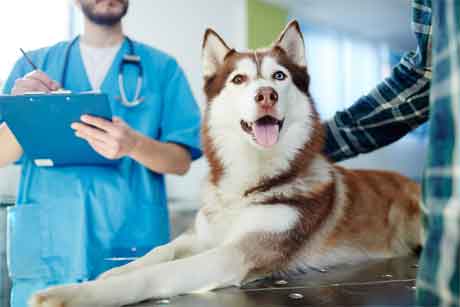How to Ensure You Pick a Healthy Dog
Wherever you’re going to get your new dog from, whether humane society or breeder, you should first check to make sure the dog you’ve picked is in good health both physically and mentally. Here are some things you can do to make sure the dog you want is healthy and ready to take home.
Discharge. Look for discharge from the eyes and nose. Several illnesses have a thick, greenish discharge. Note the color and consistency of any discharge you see from either area. If the dog is already being treated by a veterinarian for the discharge (meaning it’s easily curable through medication) you shouldn’t worry about taking the dog home and finishing the treatment yourself. If there’s uncertainty as to why the dog has discharge, be wary of getting the dog before you know what’s wrong. We have provided you detail about dog health; if you want to explore your knowledge.

Coat and skin. Be thorough in your examination of the dog’s coat and skin. A healthy dog should have a shiny coat with no signs of fleas or hair loss. Though fleas are easily treatable, it’s still something you don’t’ want to take home with you. They have a tendency to spread, especially if you have other animals. Hair loss can have many causes, some easily treatable and others requiring lengthy treatments and medication throughout the entirety of the dog’s life. If you aren’t willing or able to put up with the causes of the hair loss, depending what they are, you might want to pass on getting that dog.
Stool. If possible take a glance at the dog’s stool. A lot of parasites can be seen visibly in the stool of the animal they’re infecting. Bloody or loose stool can also be a sign of parasites or other medical problems the dog has. Deworming medications will take care of the parasites, but other health problems might not be so easily remedied.
Cough. A dry, hacking cough is often associated with kennel cough, common among shelter dogs and dogs kenneled with other dogs. A course of antibiotics will treat it, but if left untreated it can develop into something more serious.
Alert. Get a dog that is alert and responsive. A healthy dog will want to play and become excited. A lethargic or unresponsive dog may have other medical conditions that may or may not be easily treatable.
Temperament and medical records. Ask about the temperament of the dog. If it displays aggression when his feet are touched or shows separation anxiety, you need to know. Some inexperienced dog owners shouldn’t handle these issues and need to know before getting the dog. Also, you need to know what vaccinations the dog has had and if it’s on heartworm medication (which it should be). You will also want to know if the dog has any previous health concerns or has medical problems now.
After bringing the dog home, your first stop should be a trip to the vet to have a full examination. You should discuss with whoever you’re buying the dog from what will happen if the dog has any medical conditions (if you can return the dog). You might not be guaranteed a healthy dog just by these recommendations, but at least your chances of success will improve greatly.
